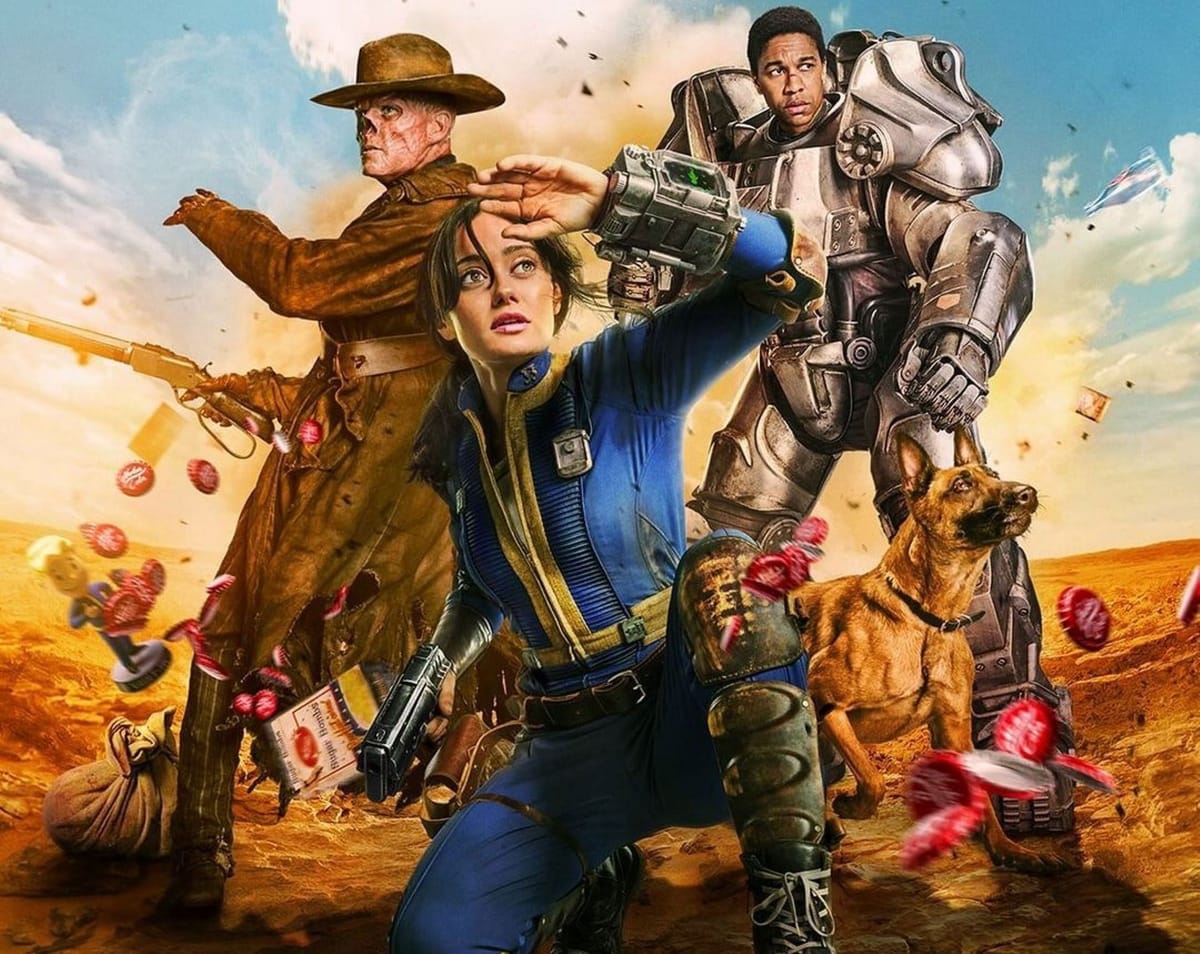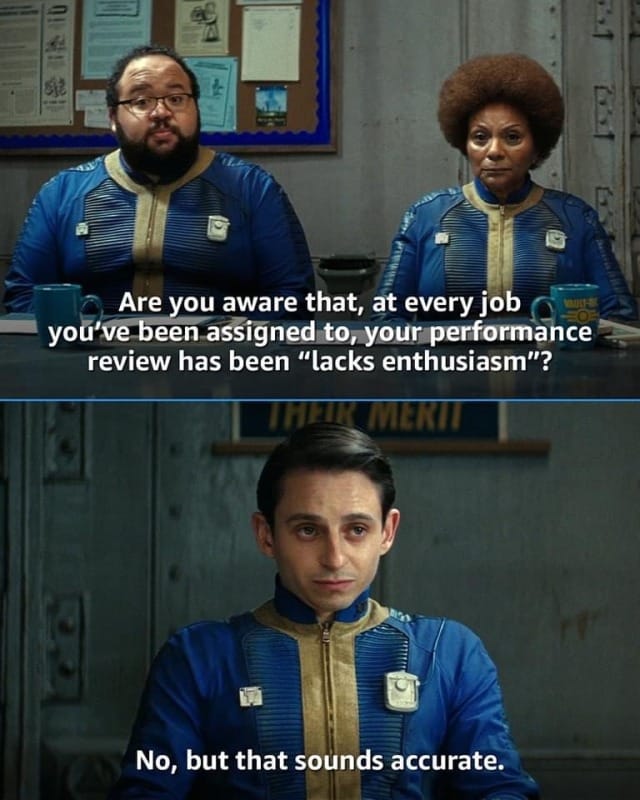Fallout is More Than Simply Okey-dokey: It's The Millennial Reality
Fallout is a television series for the modern Millennial: stressed, exhausted, and still saying "Okey-dokey" as we try to keep a roof over our heads.

Fallout is a television series for the modern Millennial: stressed, exhausted, and still saying "Okey-dokey" as we try to keep a roof over our heads.
I love the Fallout video games. I started playing them with the release of Fallout 3, what seems like a lifetime ago. Now, with the release of the Fallout TV series on Amazon Prime, the fandom has been revitalized, and I've found myself snorkeling happily through the ocean of great fan-art that's started to emerge.
Fallout is an alternate-future vision of Earth, where the dream of transportable fusion power was realized in the 1950s. But, after decades of Cold War and increasingly terrifying pressure from capitalist America, war ignited and brought nuclear fire down upon the land. While many found ways to survive the apocalypse, none are so iconic in Fallout as the "vault dwellers," those descendants of the wealthy and privileged who were sequestered in underground corporate "vaults."
In most of the Fallout tales, vault-dwellers take on the central role, as they emerge hundreds of years after the nuclear holocaust and discover a wasteland brimming with mutated, radioactive life, and strange communities of people struggling to survive. It's a template for horror, for social-reflexivity, and for an exceptional amount of gallows-humor about the epilogue of humanity.
When the Fallout TV Series was announced, I was skeptical. Extremely skeptical. How could this almost cartoonish world be translated onto the small screen? Could the inherent violence of the series be tempered by the strangely compassionate undertones that sometimes emerge throughout the series?
When I heard that Amazon was producing the show, my skepticism turned to outright disappointment. Amazon is, after all, an utterly disgusting institution that's eerily reminiscent of the evil corporations in Fallout itself!
Could it be done? Could an Amazon-produced show be anything other than mediocre fluff?
Yes, as it turns out. The answer is: Yes.
Fallout the TV series (or "Fallout Prime" as its fans often call it) roughly follows pieces of a plot line similar to Fallout 3. Don't worry, I try to stay free of spoilers here. Suffice it to say, the wasteland in the show is definitely the one players of the video games will remember. However, it's also a story totally accessible to people who have never heard of the series before. That's a really hard balance to achieve, but this team did it well.
The story
We follow the main character, Lucy MacLean (played by a delightful Ella Purnell), as she graduates from the innocence of her Vault-centered life into a robust character trying to hold the best of humanity together while trapped in the darkest of circumstances. Aaron Moten plays "Maximus," a Brotherhood of Steel wannabe, and the superlative Walton Goggins plays Cooper Howard - a "ghoul" whose radiation sickness allowed him to live for hundreds of years. Lucy's the driving force in the show, though, and she's an absolutely delightful protagonist.
The way Lucy says her little catchphrase of "Okey-dokey" is not only adorable, it's also relatable in the extreme. I've started thinking "Okey-dokey" to myself as I deal with any of the infinite struggles related to our hellish capitalistic meritocracy. I imagine I'll keep saying this to myself if the world continues to backslide into autocracy and violence.
Okey-dokey. It's time to do what needs to be done.
This phrase inspired Spooky-Daggers, a professional artist and Tumblr denizen, to craft their own rendition of the Internet-famous "This is Fine" burning room meme. The original, by artist KC Green, was published in 2013 as part of a comic titled “On Fire” for his webcomic series Gunshow.
Spooky's Fallout-themed version features Lucy saying "Okey-dokey" in the middle of a grim wasteland scene, and is at-once a perfect homage to Green's classic, and an update that captures the infinitely relatable vibe of Fallout.
You can read my full interview with Spooky-Daggers here.

There are still issues with the series. Some of these are "speed of plot" problems that are both the hallmark of modern TV writing and an issue with the condensed 10-episode seasons that shows are forced into these days. I'm also curious to see how well the show's fans engage in a process of critical media self-reflection. Is it purely escapist fun for the majority, or are some of the subversive elements really making it through? I hope for the latter, if only because Amazon piloting the seeds of its own destruction would be totally grand.
Fallout's just one big social critique wrapped up in blood, guts, and witty one-liners.
I fell in love with the series because I found myself invested in both the leading characters and in the ethical issues presented in each episode. Ethics is actually a huge part of the Fallout gaming experience (at least the way I play it), so it was good to see that aspect highlighted (albeit in the bloody, snarky, darkly-humorous way one would expect from the source material).
But, as the audience for both the games and the series, I bring years of training in film school, and a decade of experience as a creative writer, journeyman philosopher, and armchair media critic. What I'm saying is: I've got the experience to parse the media I view. Can everyone else who's fanning up say the same?
I discussed the Fallout series with someone recently who comes from a minority background, and they said something that stuck with me:
"It worries me how shows like this can become proving grounds for white nationalists."
This is certainly a problem with plenty of shows. But, I think it's one that Fallout actually manages to avoid.
The series certainly presents morality and ethics as a spectrum, without easy absolutism. "Good" people might need to do bad things to make the world better, or even just to survive. "Bad" people can do good things accidentally or by effort, and might have lovable traits that make them sympathetic from a certain point of view.
And yet, Fallout is pretty clear about the things that aren't "good." Chauvinism, broadly speaking, is pretty heavily critiqued. Meritocracy is questioned with a capital "Q". Capitalism's inherent self-destructive qualities are critiqued (in a way that is central to the plot). Subservience to totalitarian forms of socialism are likewise probed.
Fallout's just one big social critique wrapped up in blood, guts, and witty one-liners.
To my mind, that self-reflexivity is what elevates the series. It's more than just having a really well-cast trans person (Xelia Mendes-Jones, who plays Dane, Maximus' closest friend in the Brotherhood, did a fantastic job as part of the supporting cast) as part of the production. Plenty of shows are finding ways to advance representation while still missing something vital about the show/audience relationship (and the responsibility of art to improve the world).
Fallout provides both representation and self-reflective critique, and that's the sort of complete package I like to see in my science-fiction.
We know that Fallout already has a second season in the works, so I'll be extremely interested to see if the writing holds up over time (and crossing my fingers like crazy). Sometimes, popularity and success can kill good art... but I'm optimistic that, much like radroaches in the wasteland, Fallout will prove itself a survivor.
